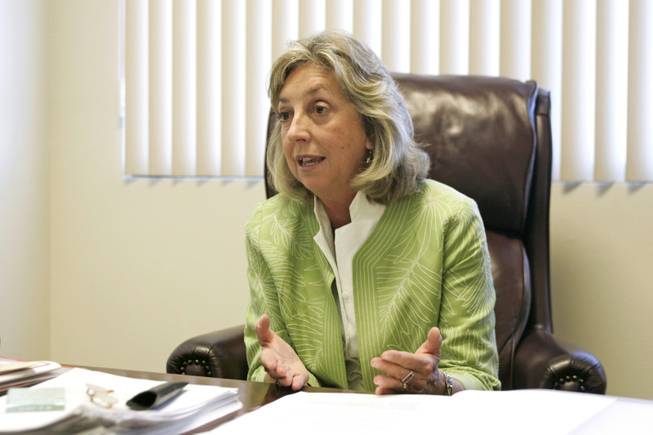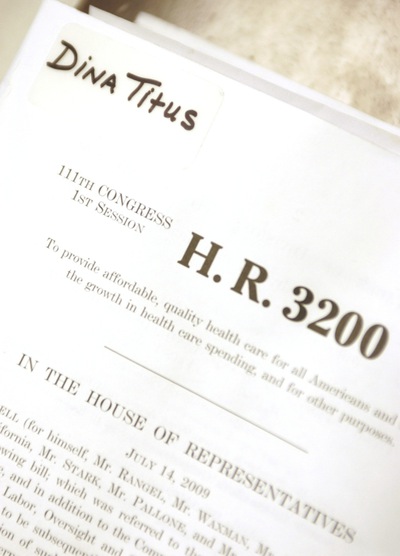Friday, Aug. 28, 2009 | 3 a.m.
Sun Archives
In Rep. Dina Titus’ office in Henderson, the health care reform bill sits on the desk once used by Democratic Sen. Howard Cannon.
Because the bill has drawn controversy in recent weeks, she has the pages tabbed to sections for easy reference when discussing health care with someone. Titus, D-Nev., surprised many supporters when she voted against the House bill in the Education and Labor Committee, but that doesn’t mean she is opposed to reforming the health care system.
She hasn’t yet decided which way she will vote, but she supports reform that doesn’t impede small business and that covers those without insurance.
IBLV: You voted against the House bill in the Education and Labor Committee, citing concerns about an employer mandate. Can you explain what that provision is and why it was important to vote no?
Titus: Well, I thought that it put too much of a burden on small businesses. If you look at (Congressional) District 3, it’s the suburbs, so there’s a lot of small shopping malls, a lot of independently owned businesses and restaurants. I thought that a mandate on small businesses was more than they could stand at this time, with the economy the way it is and unemployment the way it is. If they had to provide health insurance at an additional cost, then they might end up laying off people.
If you look at the original provision, it was kind of a triple hit on small businesses. First, you either had to provide health insurance, which they would be doing now if they could afford it, or get into the exchange, which cost you 2 percent on payroll tax. Now, you got a tax break of up to 40 percent, I believe, if it’s under $250,000, but still ... that’s the first hit.
The second thing is, you couldn’t get into the exchange the first year unless you had fewer than 10 employees, and you couldn’t get in until the second year if you had (between 10 and 15). I thought that left a lot of people out, because a small business can have more than 10 employees, and that was my amendment.
The third problem is that businesses got hit another time because many of them are individually owned S-1 corporations, so their income would be taxed like personal income, and there was going to be a charge on personal income tax for families ... so all of those things worked against a small business.
Business owners who provide insurance end up subsidizing the cost of health care for the uninsured. Won’t making sure the uninsured are covered be a big plus for the businesses that already cover workers?
Absolutely, I think it will. It will be a big plus for businesses, and it will also be a big plus for individuals. We know that everybody pays about $1,100 hidden tax to cover the uninsured. That’s both in covering for hospital costs and drug costs; insurance premiums are higher; you have to provide social services through your taxes. So if we can help small businesses cover those uninsured, and we can find way to cover those who may not be employed but are uninsured, I think that helps everybody. My problem with it was the way it was set up. I thought it wasn’t a net gain the way that we were going to help small businesses provide that insurance.
But I absolutely believe we need to cover the uninsured.
Without the employer mandate, what’s to stop businesses from cutting the coverage they already provide and dumping their workers into a public option program?
Well, nothing, really, except there are a lot of businesses (that) have policies in place, their employees like them. It’s a way to attract good employees to provide those kinds of good benefits, but I think that everybody has to have some skin in the game. So, if you’re not going to provide insurance, then you’re going to have to help to pay for the exchange — I mean the public option that’s part of that exchange, to help cover those who aren’t being covered, which is, I think, your share of the burden.
You’ve seen that in the past with companies like Wal-Mart: When you apply for the job at Wal-Mart they give you an application form, I’ve heard, to get ... Medicaid or some other kind of benefits because they’re not covering it. That’s just not fair to the rest of the people.
When people complain about the government running health care and interfering with the choices doctors and patients make, aren’t they missing the reality that health insurance companies already run the system and interfere with doctors’ and patients’ choices?
Yes, they are. I think that’s a red herring, it’s a scare tactic — and it’s a scare tactic for several reasons. One is, many people call here and say, “We don’t want socialism, we don’t want a government-intervention plan, and don’t mess with my Medicare” or “don’t mess with my VA benefits.” Well, what do they think those are? Yeah, they’re government-sponsored health care programs. And most people, while they may have some bureaucratic problems with the programs, like how they work overall. So, there’s a misunderstanding in that sense of it.
Second, if you have insurance now, you are limited by the plan that you buy. If you’re in an HMO, how many times have you heard that some bureaucrat is checking off the chart to see if you qualify for a test. And qualify means, “Do you pay for that coverage — not medically, do you need the test?”
So, absolutely, that already exists. The public option, remember, is jutst an option to compete with the private plans. You’re not going to have government stepping in, you’re just going to have another choice.
Government options, such as Medicare and Medicaid, already cover tens of millions of Americans. Why are Republicans and some businesses so afraid of a public option or a government-run plan that businesses or individuals could get coverage from?
Well, I don’t understand it. It seems to me there’s a lot of room for a compromise. The plan would be actuarially sound; you could put some restrictions on the plan so that it doesn’t have an unfair advantage. It has to provide the exact same kind of coverage that any of the other companies in the exchange would provide.
Insurance companies aren’t nearly as vocal against it this time as they were against Medicare because they see a whole bunch of new patients that they will now be suddenly able to insure. It could be good for business because they’re going to get more customers, so I don’t really understand what the fear is. It’s just that some of the forces that want the status quo because that’s what they’re used to or that’s the way they’ve made their money. You have to ask them.
You’re a political scientist. Do you expect we’ll see a health care reform bill passed and signed into law this year?
Well, certainly the president continues to make it a priority. I’m glad we didn’t do it before the recess. I’m glad we came home and had time to talk about it and listen to what people had to say, so we can go back and make some changes. I think there will be something passed in terms of health care reform.
Now, there are three parts of it. There’s health care reform that has to do with overall health care and is aimed primarily at preventive care so that we can stop diabetes by addressing childhood obesity, for example. Most people agree with those provisions.
The second part, insurance reform, portability ... no caps on lifetime coverage, no preexisting conditions, a lot of people agree on that.
It’s the third part of the plan, covering those uninsured, that’s the most controversial. I think there’s potential that some of that will get passed.
I understand you had quite a turnout on Saturday at your town-hall meeting. What kind of interaction have you had with your constituency regarding this issue? And how much of an effect will it have on your vote?
Well, let’s see. We had a telephone town hall. I have met with a number of small groups — you’ve been to some of those meetings — I’ve meet with the Realtors, I’ve met with the chambers of commerce, I’ve met with some ... health care providers, met with the restaurant association. We also did our regular Congress on the Corner, which had over 300 people in the parking lot of an Albertson’s. I spoke to the Rotary (Club) in Boulder City just about this topic, got a lot of input. We have had thousands of e-mails and phone calls that we all record whatever it is that they are saying, respond to all the letters. So there’s been a lot of (feedback). I’m out there on the streets — people stop me all the time — so it’s been a lot of input. It’s been good. I thanked the people who came to the town hall because, even though there’s a lot of hollering and signs in the parking lot, when they come and sit down across the table from you, look you in the eyes and talk about it substantively, we make progress.
And one other thing, we have the bill with some of those key provisions — is that it right there (pointing to House bill on her desk)? — tagged so that when they say, what about those death panels, we can open the page up and point right to the provision in question. So I think people have gotten some good information, and I’ve heard their concerns.
And what effect will that have on your vote?
Well, I’m trying to be very deliberative about it. When people say, will you commit right now to voting for it, or will you commit right now to voting against it, I say no, we’re going to get the bill, have another town hall when we’re all reading off the same page and then I’ll decide and move forward. But this is so important that I think you’ve got to do it right.
You were saying you’ll have another town hall. When?
I think we’ll have some form of the bill before the end of September, so whenever I come home for that next (visit), probably the middle of September because I try to come home at least every other weekend, we’ll try to have one.




Join the Discussion:
Check this out for a full explanation of our conversion to the LiveFyre commenting system and instructions on how to sign up for an account.
Full comments policy